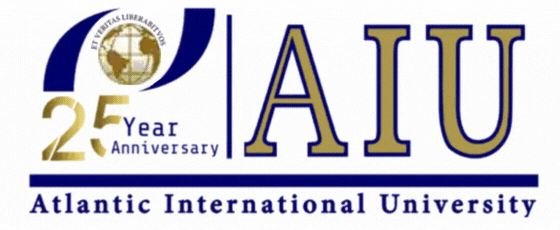- RESEARCHDistance Learning at AIU is enhanced by vast academic resources and innovative technologies build into the Virtual Campus: Hundreds of self-paced courses with video lectures and step by step lessons, thousands of optional assignments, 140,000 e-books, the Social Media & Networking platform allowing collaboration/chat/communications between students, and MYAIU develop students holistically in 11 areas beyond just academics.
- PROGRAMS OFFERED
- Areas of Study
- Courses and Curriculum
- Open Courses
- Register for a Program
- Associate Program
- Associate in Addiction Counseling
- Associate in Agriculture Food And Resources
- Associate in Anti Terrorism Security
- Associate in Behavior Analysis In Special Education
- Associate in Bioethics
- Associate in Climatology
- Associate in Cultural Theological Communication
- Associate in Culinary Arts
- Associate in Ecotechnology
- View all Associates Programs
- Bachelor Program
- Bachelors in Community Development
- Bachelors in Environmental Science
- Bachelor in Education (B.Ed, BS)
- Bachelors in Economics
- Bachelors in Entrepreneurship
- Bachelors in Financial Administration
- Bachelors in Human Resource Management
- Bachelors in Linguistics
- Bachelors in Nutritional Science
- Bachelors in Occupational Health and Safety
- Bachelors in Psychology
- View all Bachelor Programs
- Doctorate Program
- Doctor | of Biology (PhD)
- Doctorate in Business Administration (DBA, PhD)
- Doctor of Economics (PhD)
- Doctor of Electrical Engineering (D.Sc, PhD)
- Doctor of Finance (PhD)
- Doctorate in International Relations
- Doctorate in Information Technology (D.Sc)
- Doctor of Legal Studies (PhD)
- Doctor of Project Management (PhD)
- Doctor of Sociology (PhD, D.Sc)
- Doctorate in Sustainable Natural Resources Management
- View all Doctorate Programs
- Master Program
- Postdoctoral Program
- Postdoctoral in Animal Science
- Postdoctoral in Anti Terrorism Security
- Postdoctoral in Behavior Analysis In Special Education
- Postdoctoral in Bioethics
- Postdoctoral in Blockchain Technology and Digital Currency
- Postdoctoral in Business Management
- Postdoctoral in Cloud Computing
- Postdoctoral in Computer Engineering
- View all Postdoctoral Programs
AIU offers a wide range of majors in areas including the Arts, Business, Science, Technology, Social, and Human studies. More than 120 degrees and programs are available for adult learners at the associate’s, bachelor’s, master’s, doctoral and postdoctoral level. - VIRTUAL CAMPUS
Distance Learning at AIU is enhanced by vast academic resources and innovative technologies build into the Virtual Campus: Hundreds of self-paced courses with video lectures and step by step lessons, thousands of optional assignments, 140,000 e-books, the Social Media & Networking platform allowing collaboration/chat/communications between students, and MYAIU develop students holistically in 11 areas beyond just academics.
- ALUMNI
The world is YOUR campus!”, that is the message of AIU’s month magazine Campus Mundi. Hear the voices and see the faces that make up AIU. Campus Mundi brings the world of AIU to you every months with inspirational stories, news and achievements by AIU members from around the world (students and staff are located in over 200 countries).
Final Thesis
Assessing Cost Production and Pricing Policies as Sustainable Enablers in Zimbabwe's Energy Sector
This thesis evaluates the cost production and pricing policies within Zimbabwe’s energy sector, highlighting their role as sustainable socio-economic enablers. It aims to enhance local understanding of energy economics, address tariff under-recovery, and integrate renewable energy into the regional SADC framework, fostering economic growth and energy market efficiency.

The thesis titled “Assessment of the Cost Production and Pricing Policies for the Energy Sector as a Sustainable Socio-Economic Enabler for Doing Business in Zimbabwe” by Charles Kanyunga provides a comprehensive analysis of the energy sector in Zimbabwe, focusing on the economic implications of cost production and pricing policies.
Overview
The research is motivated by the critical need for accurate and accessible information regarding energy costs, which is essential for effective energy management in manufacturing and other sectors. Kanyunga emphasizes that a well-structured energy pricing policy can significantly impact economic growth and sustainability in Zimbabwe.
Objectives
The primary objectives of the study include evaluating the current cost production and pricing policies in Zimbabwe’s energy sector, identifying the challenges and opportunities within the energy market, and proposing strategies to enhance the socio-economic benefits derived from energy production and consumption.
Methodology
Kanyunga employs a mixed-methods approach, utilizing both qualitative and quantitative data. The research draws on secondary data from various sources, including reports from the Zimbabwe Energy Regulatory Authority (ZERA), ZESA Holdings, and other relevant institutions. The study also incorporates case studies of independent power producers (IPPs) to illustrate the practical implications of energy pricing policies.
Key Findings
1. Energy market dynamics: The thesis reveals that Zimbabwe has a significant energy market, both nationally and regionally, but the business of electricity generation, supply, transmission, and distribution is not fully optimized. There is a notable gap between the actual customer base and the recorded order book.
2. Tariff under-recovery: A critical issue identified is tariff under-recovery, which poses challenges for debt repayments and financial sustainability within the energy sector. The study highlights the need for a reevaluation of tariff structures to ensure they reflect the true cost of energy production.
3. Integration of renewables: Kanyunga discusses the potential for integrating renewable energy sources into the regional Southern African Development Community (SADC) energy framework. This integration is seen as vital for enhancing energy security and promoting sustainable development.
4. Economic fundamentals: The research underscores the importance of understanding economic fundamentals in energy pricing. Factors such as population demographics, literacy levels, and infrastructure play a crucial role in shaping energy policies and their effectiveness.
Recommendations
The thesis concludes with several recommendations aimed at improving the energy sector in Zimbabwe. These include implementing comprehensive policy reforms to address tariff structures and ensure they are economically viable, encouraging investment in renewable energy technologies to diversify the energy mix and reduce dependency on traditional energy sources, and enhancing the capacity of local stakeholders through training and education on energy economics and management.
Conclusion
Kanyunga’s research contributes significantly to the understanding of energy economics in Zimbabwe. By addressing the complexities of cost production and pricing policies, the study provides a framework for policymakers and industry stakeholders to foster a more sustainable and economically viable energy sector. The findings advocate for a collaborative approach to energy management that aligns with regional goals and promotes inclusive growth.
Atlantic International University
Get to know the AIU experience
Contact Us Today!
We understand how busy adults do not have time to go back to school. Now, it’s possible to earn your degree in the comfort of your own home and still have time for yourself and your family. The Admissions office is here to help you, for additional information or to see if you qualify for admissions please contact us. If you are ready to apply please submit your Online Application and paste your resume and any additional comments/questions in the area provided.
Pioneer Plaza
900 Fort Street Mall 905
Honolulu, HI 96813
800-993-0066 (Toll Free in US)
808-924-9567 (Internationally)
808-947-2488 (Fax)
AIU Success Stories







Contact Us Today!
Begin Your Journey!
AIU’s Summer of Innovation and Growth gives you the ability to earn up to $5000 in tuition credit by completing free lessons and courses.
Whether you’re looking to acquire new skills, advance your career, or simply explore new interests, AIU is your gateway to a world of opportunities. With free access to 3400 lessons and hundreds of courses the ability to earn credits and earn certificates there’s no better time to start learning.
Join us today as a Guest Student and take the first step towards a brighter, more empowered future.
Explore. Learn. Achieve.
Degrees

Contact Us
Atlantic International University
900 Fort Street Mall 905 Honolulu, HI 96813 [email protected]
Quick Links
Home | Online Courses | Available Courses | Virtual Campus | Career Center | Available Positions | Ask Career Coach | The Job Interview | Resume Writing | Accreditation | Areas of Study | Bachelor Degree Programs | Masters Degree Programs | Doctoral Degree Programs | Course & Curriculum | Human Rights | Online Library | Representations | Student Publication | Sponsors | General Information | Mission & Vision | School of Business and Economics | School of Science and Engineering | School of Social and Human Studies | Media Center | Admission Requirements | Apply Online | Tuition | Faculty & Staff | Distance Learning Overview | Student Testimonials | AIU Blogs | Register for Program | Privacy Policy | FAQ



















